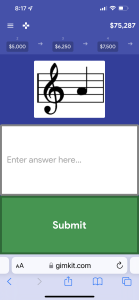

October 12, 2022
I’m writing this in August and I’m sitting at a desk at school – not the most exciting introduction, however, this would have been extraordinary last year. This time last year, I was at home and starting my second week of lockdown, a lockdown that would eventually last 100 days. Even when it finished, the flow-on-effect was considerable, and the classrooms we returned to had changed.
Staples of music education such as Wind Instruments were banned, or at best confined to outdoors, and itinerant teachers could not teach across multiple schools. Students were allowed back, but many were hesitant or had other barriers preventing this from happening. It has been a time of significant change and, therefore, a reasonable time to reflect.
One of my lockdown online success stories came from the game Gimkit (gimkit.com). Gimkit is similar to other online gaming platforms like Kahoot in that the teacher accesses (or creates) a kit of questions. Where it differs is that the students answer the questions at their own pace, with questions appearing on their individual screens and the teacher’s screen projecting the scores. Where this game excels (in my opinion) is gamifying rote learning (yes, I’m well aware of memorisation being such a lowly peg on most learning taxonomies, but it’s still such a useful way of building a strong basic understanding). Gimkit rewards correct answers with in-game dollars, which can then be used to purchase ‘upgrades’ (increasing your ability to earn money faster) or ‘powerups’ (different functions including the ability to punish or support others). In short, it was made by a student to make learning more fun for students. As the creator says on the website:
“Hey, I’m Josh! I started Gimkit as a high school project.”
Games really helped me become engaged in school. That’s why I built Gimkit — to be the kind of game I’d want to play in class.”

The full version of Gimkit is subscription based, but they have recently released a free version that incorporates most if not all the features I tend to use. It incorporates a concept called ‘Smart Repetition’ where an incorrect response triggers an increase of that question being asked.
Most of all, I find my students really enjoy this concept of learning. I play along with them, and while some students want to simply win, others are keen to spend their dollars punishing me as much as possible.
The gamification of learning may not be to everyone’s tastes, but during those long lockdown lesson days, it certainly helped increase engagement from my ākonga and provided a welcome change from Kahoot. Gimkit is less well known than other programmes so the risk of overuse and over-itness is lessened.
Now that we are back in classes and edging ever closer to being back to normal, I realise how much I enjoy having real-world contexts as a basis for assessment and authentic learning. The likes of Smokefree Rockquest and Tangata Beats or the Lion Foundation Songwriting competition provide this, and I am certainly hopeful, if not a little anxious, that we will be able to continue this with the new standards currently being written.
So much of what we do as music educators is that blurred line of education occurring outside the constraints of a normal classroom – and is also what makes our subject area so exciting for our learners.
Words by: Tim Randle

BIO: Tim Randle is a proud Otautahi man, currently in Auckland where he has been squatting for some time. Head of Music at Manurewa High School, Tim’s passions are (in no particular order) bass – single and double, malt whiskey – single, Arsenal, the Crusaders, the All Blacks, the Black Caps and his kittens, kids and wife.